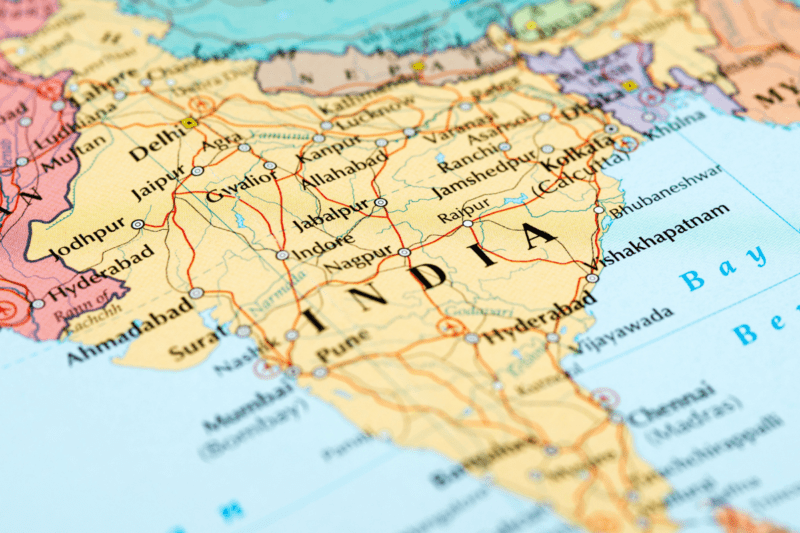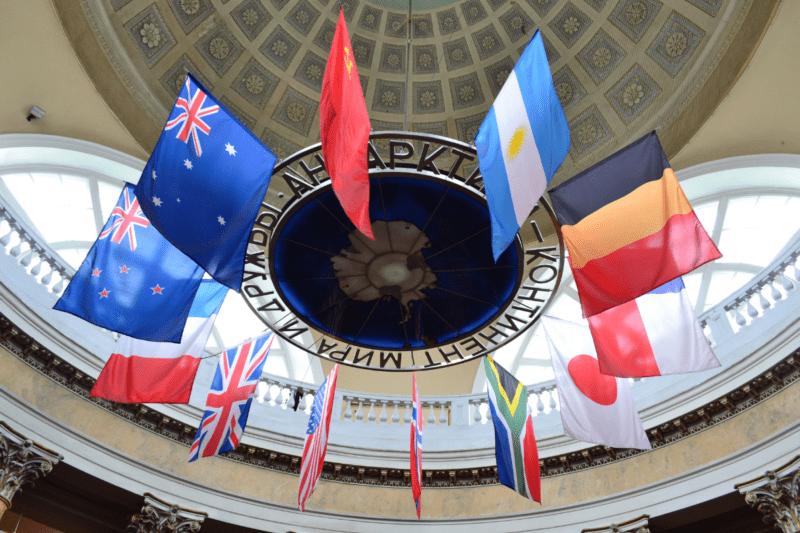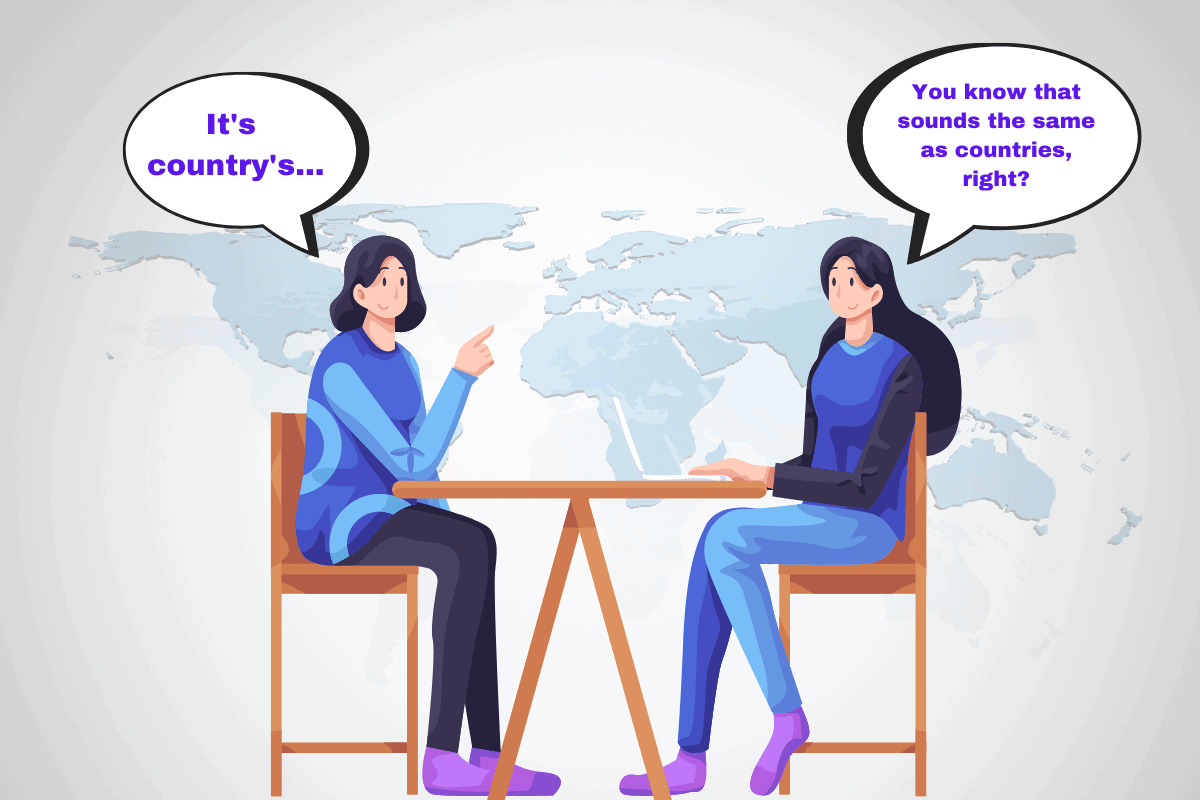Have you ever struggled knowing when to use the correct possessive form of “country”?
It can be confusing, especially since all three variations sound the same when spoken aloud.
For example, let’s say you want to talk about the economic situation of multiple countries. Do you say “the countries’ economies” or “the countries economies”?
Or perhaps you’re describing the population growth of a particular country. Is it “the country’s population growth” or “the countries population growth”?
Getting tripped up on these pesky little details is easy.
But don’t worry.
In this article, we’ll cover the correct possessive forms of “country,” and you’ll learn how to use them like a pro.
So, grab a cup of coffee, and let’s dive in!
Table of Contents
Possessive Form of Country: Country’s or Countries’ or Countries?
The possessive form of “country” is either “country’s” or “countries’,” depending on the context. If referring to a single country owning something, use the singular form: “country’s.” When referring to multiple countries, use the plural “countries’.” “Countries” is the plural of “country” and does not indicate possession.
What Does Country Mean?

First off, let’s define what we mean by “country.” In this context, we’re referring to a nation or state with its own government and territory. Examples of countries include the United States, Canada, Mexico, and Kenya.
Why Do Possessive Forms Matter?
Let’s discuss why possessive forms are essential in writing and communication. Simply put, possessive forms indicate ownership or association. They allow us to clarify who or what something belongs to, which is essential in conveying information accurately and effectively.
So, what is the correct possessive form of “country”? As you may have guessed, there are three variations to consider: “country’s,” “countries’,” and “countries.” Let’s explore each one in more detail, shall we?
Singular Possessive Form: Country’s

Let’s start with the singular possessive form of “country,” which is “country’s.”
To form the singular possessive, add an apostrophe and an “s” to the end of the word “country.” So, for example, if you want to talk about the economy of a specific country, you would write “the country’s economy.”
Here are a few more examples to help you get the hang of it:
The country’s flag was flying high above the capitol building.
She had always dreamed of visiting the country’s famous landmarks.
The country’s leader announced the new policy.
When should you use the singular possessive form of “country”? Typically, you would use it when referring to something that belongs to or is associated with a single country. So, for example, you might say “the country’s language” when talking about the official language of a specific nation.
However, it’s important to note that the singular possessive form should not be used when referring to multiple countries. In that case, you would use one of the plural possessive forms we’ll discuss next.
Plural Possessive Form: Countries’

Let’s move on to the plural possessive form of “country,” which is “Countries’.”
To form the plural possessive, add an apostrophe after the “s” at the end of the word “countries.” So, for example, if you want to talk about the economies of multiple countries, you would write “the countries’ economies.”
Here are a few more examples to help you see it in action:
The countries’ leaders met to discuss the global trade agreement.
The countries’ alliance held firm in the face of their enemies.
The countries’ populations have grown significantly over the past decade.
You would use the plural possessive form when referring to something that belongs to or is associated with multiple countries. For instance, you might say “the countries’ flags” when referring to the flags of several nations.
Plural Form: Countries

Let’s move on to the plural form of “country,” which is simply “countries.”
To form the plural, add an “s” to the end of the word “country.” So, for example, if you want to talk about the histories of multiple countries, you would write, “the countries have rich and varied histories.”
Here are a few more examples to help you see it in context:
She visited several countries in Europe over the summer.
The countries of Asia have some of the world’s largest populations.
The summit was attended by leaders from many different countries.
It’s important to note that the plural form of “country” does not indicate possession. If you want to indicate ownership or association, use one of the possessive forms we discussed earlier.
To differentiate between the plural and possessive forms, pay attention to the context in which the word is used. If you’re referring to something that belongs to or is associated with a single country, use the singular possessive form. If referring to something that belongs to or is related to multiple countries, use one of the plural possessive forms. Use the plural form if you’re referring to multiple countries without indicating ownership or association.
Does Country’s Always Indicate Possession?

“Country’s” can also be a contraction of “country” and “is.” In this case, it does not indicate possession.
To determine whether “country’s” is being used as a possessive or a contraction, look at the sentence’s context. For example, if the sentence makes sense when you replace “country’s” with “country is,” then it’s being used as a contraction.
Here are a few examples to help you see it in action:
The country’s economy is booming. (Possessive)
The country’s in turmoil right now. (Contraction)
In the second example, “country’s” is being used as a contraction of “country” and “is.” You could replace it with “country is” and the sentence would still make sense: “The country is in turmoil right now.”
It’s essential to pay attention to the context of the sentence when using contractions like “country’s.” Using contractions can help make your writing sound more conversational and less formal, but you want to ensure that they don’t cause confusion for your readers.
Why Can’t I Just Say “Flag of the Country?”

While phrases like “flag of the country” can certainly avoid the possessive form, sometimes using the possessive can help make your writing more concise and easier to read. Using the possessive form can be more efficient than a longer phrase in most contexts.
For instance, saying “the countries’ economies” instead of “the economies of the countries” can be more concise, especially if you are discussing the economies of multiple countries throughout your writing.
Using the possessive form can also help avoid repetition, making your writing sound more fluid and natural. However, it’s essential to balance conciseness and clarity, so choose the phrasing that best conveys your intended meaning.
Why Is It Countries’ and Not Countries’s?
Great question! When a noun is plural and ends in an “s,” the possessive form is typically formed by simply adding an apostrophe after the “s.”
For example, if you’re talking about the books of multiple authors, you would write “the authors’ books” with an apostrophe after the “s” in “authors.”
The same rule applies to the plural form of “country.” Since “countries” is already plural and ends in an “s,” you would form the possessive by adding an apostrophe after the “s” as well, resulting in “countries’.”
Adding an additional “s” after the apostrophe would create a redundant or unnecessary construction, so it is not used. Therefore, the correct possessive form of “countries” is “countries’.”
Now You Know When to Choose Country’s or Countries
Knowing the correct possessive form of “country” and “countries” is crucial for effective writing and communication.
“Country’s” is the singular possessive form, “countries'” is the plural possessive form, and “countries” is the plural form without any indication of possession.
You can convey ownership and association accurately and clearly using the correct possessive forms. Remember to keep your writing concise and avoid redundant phrases such as “flag of the country.”
With this knowledge, you can confidently express your ideas and convey your message accurately in your writing.
Frequently Asked Questions
Can we use an apostrophe with country?
Yes, we can use an apostrophe with “country” to form the possessive form. In English grammar, the possessive form of a noun is used to show ownership or relationship between two or more things. To form the possessive form of “country,” we add an apostrophe and the letter “s” after the word, as in “the country’s economy” or “the country’s flag.”
Can we use possessive with countries?
Yes, we can use the possessive form with the plural noun “countries” by adding an apostrophe after the “s.” This is used to indicate possession or association between something and multiple countries. For example, “the countries’ economies” refers to the economies of multiple countries.
What is the plural of country’s?
“Country’s” is already the singular possessive form of “country,” and it does not have a plural form. The plural of “country” is “countries.”
Is country’s correct?
Yes, “country’s” is correct as the singular possessive form of “country.” It indicates that something belongs to or is associated with a single country.
Is country’s a word?
Yes, “country’s” is a word in English grammar. It is the singular possessive form of “country.”
What is countries’ meaning?
“Countries'” is the plural possessive form of “country.” It indicates that something belongs to or is associated with multiple countries. For example, “the countries’ flags” refers to the flags of multiple countries.

